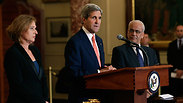
Kerry speaks to Netanyahu, Abbas after prisoner release canceled
After Palestinians make new demands, Israel delays release of fourth tranche of prisoners, Kerry attempts to salvage peace talks.
Washington - US Secretary of State John Kerry has spoken to both Prime Minister Benjamin Netanyahu and Palestinian President Mahmoud Abbas. His call came after Israel announced it will not release the fourth tranche of Palestinian prisoners and after Palestinains set forth a new list of demands, hinting talks are nearing collapse.
Peace negotiations have hit a rough patch amid mutual accusations of bad faith. Earlier Thursday Palestinian sources told Ma'an that a nine-hour meeting between US Special Envoy Martin Indyk, Erekat, and Israeli negotiators Tzipi Livni and Yitzhak Molcho failed to reach results Wednesday. The source described the meeting as a "fierce political battle," with Indyk struggling to control heated exchanges between both sides, Maan reported.
Related stories:
- Palestinians publish new list of demands
- Israel says it is cancelling prisoner release
- Kerry: Israeli, Palestinian leaders must 'lead'
Tzipi Livni's spokeswoman said Thursday that the government was working to finalize an agreement to free the prisoners when Abbas signed letters of accessions to 15 international conventions.
Livni said the prisoner release was contingent on the Palestinians refraining from making unilateral moves and now that "new conditions were established, Israel cannot release the fourth batch of prisoners."
Speaking earlier Thursday during a visit to Algeria, Kerry called it a "critical moment" for talks
and said "You can facilitate, you can push, you can nudge, but the parties themselves have to make fundamental decisions and compromises."
Refrencing the adage that you can lead a horse to water but can't make it drink, Kerry said "Now is the time to drink... The leaders need to know that."
In Washington, State Department spokeswoman Marie Harf said that US officials "haven't been informed of any such decision" by Israel to call off the planned release.
White House spokesperson Jay Carney said "the decision... creates challenges, and there certainly is currently no agreement on the release of this tranche."
The Palestinains slammed the decision, with Yasser Abed Rabbo, general secretary of the PLO executive committee telling AFP that " Israel has a habit of evading agreements and conventions it has signed... That is why conditions for future negotiations must change radically."
As a possible preemptive result, the Palestinians have compiled a new list of demands for the continuation of peace talks, ranging from the release of some 1,200 Palestinian prisoners to a written commitment by Israel accepting the Palestinian state along the 1967 border with East Jerusalem as its capital.
The list was presented during the firery meeting between Israelis and Palestinians but was leaked Thursday after Chief Palestinian negotiator Saeb Erekat and Mohammed Al-Aalul, a Fatah central committee member, presented the list to the PLO.
The list of demands are:
- A written commitment by Prime Minister Benjamin Netnayahu that the borders of the Palestinian state will be along the 1967 'green-line' and that its capital will be East Jerusalem.
- The release of 1,200 Palestinian prisoners, including political heavyweights Marwan Barghouti, Ahmed Saadat and Fuad Shubkhi.
- An end to the Egyptian-Israeli blockade on Gaza, and the formulation of dealing allowing the flow of goods into Gaza.
- A halt in construction in East Jerusalem.
- The IDF will not be allowed to enter Area A – the area of the West Bank under autonomous PA control since the Oslo Accords – to conduct arrests or assassinations.
- Israel will permit the PA control over Area C – currently under Israel's control.
- The Palestinians known as the Church of Nativity deportees – a group of terrorist who barricaded themselves in the Church of the Nativity on April 2, 2002 and were later deported to European nations and the Gaza Strip – will be allowed to return to the West Bank.
- The reopening of a number of Palestinian development agencies Israel shut down.
Elior Levy, the Associated Press, AFP and Reuters contributed to this report










